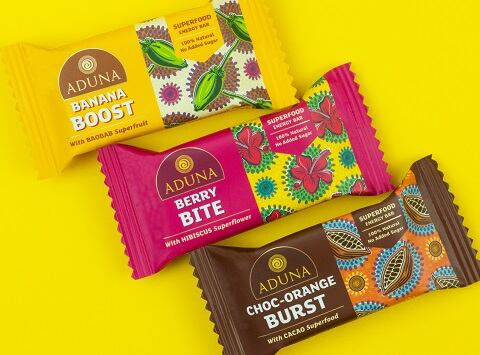“Our mission is to take underused African superfoods from obscurity to the mainstream, creating long-term sustainable and substantial markets," Aduna co-founder and CEO Andrew Hunt said.
"We've spent the last five years educating the market. We've been pretty successful and baobab is now on the map - we're at reached the point where the brand and ingredient are known by the early adopters.
"Now we’re taking baobab and moringa to the early mainstream. That’s where the real impact is going to happen.”
Aduna’s first products included powdered baobab and moringa, to be added to smoothies, porridge or used in home-baking. In order to bring the ingredients to the masses, however, it needed more convenient product formats, opting for energy bars and, launched two weeks ago, a range of herbal teas.
“The teas are causing a lot of excitement. The tea category is pretty much in stagnation – even in decline since the seventies for black tea – and the margins are so low. The herbal organic scene, however, has kicked off with double-digit growth for a decade. It’s the saving grace of the whole tea market.”
According to Euromonitor data, teas have been stagnating and overall growth is at just 3% but herbal tea is at 8% and tea pyramid at 15%.
Hunt said the combination of the tea range’s convenient format and familiar ingredients with the addition of an exotic superfood will ensure their appeal with ‘mainstream’ shoppers.
Hunt describes the taste of baobab as “healthy sherbet” with a citrusy, zingy flavour profile that pairs well lemon and ginger. Moringa, on the other hand, has a green, earthy flavour similar to spinach and needs to be blended with other ingredients to pass the taste test.
Retailing for between €5.64 and €4.22, the tea range includes: Lemon, ginger and baobab; Mint, nettle and baobab; Cinnamon spiced cacao; Green tea and turmeric; Rosehip, aloe vera and hibiscus.
Aduna expects to gain listings in its existing outlets, such as Whole Foods, Holland & Barrett and Ocado as well as mainstream retailers.
While the teabags do not contain any plastic in the sealant, they are made of nylon and are not fully biodegradable.
“People that shop in health food shops will be looking for baobab, but not in Sainsbury’s. They want convenience and functionality but also something a bit different.”
The success of the Clipper and Pukka tea brands – and their subsequent acquisition by Royal Wessanen in 2012 and Unilever in 2017 respectively – is also an opportunity for London-based Aduna’s original ‘ethical shopper’ base.
“Consumers in this market like their ethical, independent brands but these two are now owned by bigger businesses. There’s an opportunity for another brand with those ethical credentials.”
The teas were three years in the making, Hunt said, with efforts focusing on taste, branding and formulation.
Baobab is eaten in a powdered form but this is insoluble, and therefore not suitable for teas. It therefore uses chips of the whole, dried fruit.
Energising the bar category

Meanwhile, Aduna’s energy bar range has also had a recipe and branding revamp – part of the company’s learning process, Hunt admitted.
“Neither myself nor [Aduna co-founder] Nick Salter have a background in the food industry so when we first created bars, the branding was very ingredient-centric. We were so focused on the benefits and it just didn’t taste good enough; it was too dry.”
“It’s blindingly obvious for people that work in the food industry, but if I could give my former self one piece of advice, it would be that the most important thing is taste.”
Aduna enlisted the help of the same product development team that had worked with Innocent Smoothies to fine-tune the recipe.
“We taste all the bars in the category, identified the best texture, deconstructed it and did sensory testing.
“Then we looked at the positioning. We found that people want to know more about baobab or moringa but aren’t going to buy a ‘baobab bar’ [the bar’s previous name]. They are more likely to buy a bar that’s called ‘banana boost with baobab’.”
However, for the energy bars, the start-up is pursuing a different distribution strategy.
“Retailers are a bit swamped with bar offerings at the minute so to get ours into distribution channel, it’s all about London – our stronghold. We are focusing on independent shops and cafes, yoga studios and gyms.”
Dying baobabs, dwindling supply?
Baobabs recently made headlines following the publication of an article in Nature Plants on the death of a number of trees, some as old as 2,500 years, prompting speculation baobabs are vulnerable to global warming.
According to baobab ecologist and honorary researcher at the University of the Witwatersrand in South Africa, Dr Sarah Venter, however, there is no

indication that these deaths are occurring at a population level.
In response to the article, Venter wrote: “I am deeply concerned about the impact this misleading article, will have on the livelihoods of thousands of rural African people who depend on the sale of baobab fruit. Many years of work have been devoted to establishing baobab fruit supply chains that are fair trade, organic and sustainable.”
Baobab cannot be cultivated – there is no such thing as a baobab plantation – and in Ghana, where Aduna sources its fruit, the trees are community-owned.
Hunt said: “Even if there was a concern about baobab tree sustainability, the harvesting and commercialisation of this fruit is the most recognised strategy for their conservation. The main threat to baobab trees is being chopped down and replaced by cash crops. This happened in Madagascar, where they are now endangered.”
Working with over 1,000 farmers, Aduna purchased 170 tonnes (MT)) of baobab fruit in 2018, which equals about 25 MT of powder, and plans to at least double or potentially treble this next season. It buys around 15 MT of moringa.
Positive impact
Aduna’s determination to have a positive impact is present throughout its supply chain, from sourcing to manufacturing.
“Another big positive for us is that the teas are packed in a BRC-accredited facility Kenya," Hunt said. "We wanted to ensure as much of the added-value of the product stays in the country or continent.”
Hunt, who had a career in advertising before co-founding Aduna, had this advice for budding social entrepreneurs: "The most important thing is to have your social mission fully integrated into your business model. That way, the relationship between the success of your business and the positive impact you are having is direct.
“If you decide to start a business and then give a percentage of your profits to charity, it can be difficult –if the business environment becomes more challenging, your message can get side-lined.”
That said, bigger FMCG companies can get on board too, he added.
“If your original purpose is to make money but then you find a value, you could still directly integrate it into your business model - engage your staff, create a more inspiring workplace and do some good.”
